Key takeaways:
- Anti-war activism is driven by personal stories and the emotional impact of conflict, challenging individuals to seek dialogue over violence.
- Peace efforts require clear communication, trust-building within communities, and prioritizing local voices to create genuine change.
- Flexibility, inclusivity, and emotional awareness are essential strategies for effective activism and learning from past failures.
- Resilience in activism is cultivated through reflection on setbacks, celebrating small victories, and fostering collaboration among diverse groups.
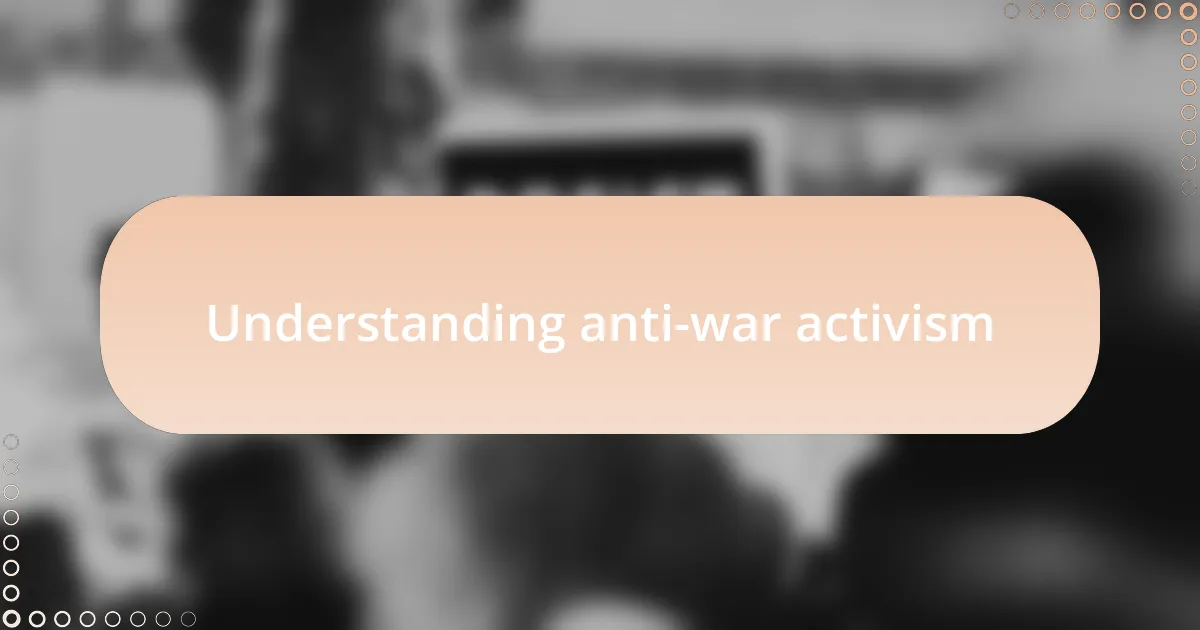
Understanding anti-war activism
Anti-war activism is rooted in a deep conviction that war harms not just countries but individuals and communities at their core. I remember attending a local rally where a veteran spoke about their harrowing experiences. Their raw emotion left an indelible mark on me, making me question how many more lives need to be shattered before we choose dialogue over conflict.
What drives someone to engage in anti-war activism? For me, it’s the personal stories of loss and resilience that stir a profound empathy within us. There’s something incredibly powerful about witnessing a mother speak for peace, her voice trembling not from anger, but from the weight of her hopes for her children’s future. It challenges us all—can we truly turn a blind eye when the stakes are so high?
The journey of understanding anti-war activism often parallels personal growth. In my experience, each protest and discussion has unveiled a layer of ignorance within myself that I didn’t even know existed. As activists, we continuously learn from the narratives shared around us, which helps us cultivate a more compassionate, informed perspective on the interconnectedness of humanity and the perpetual cycle of violence.
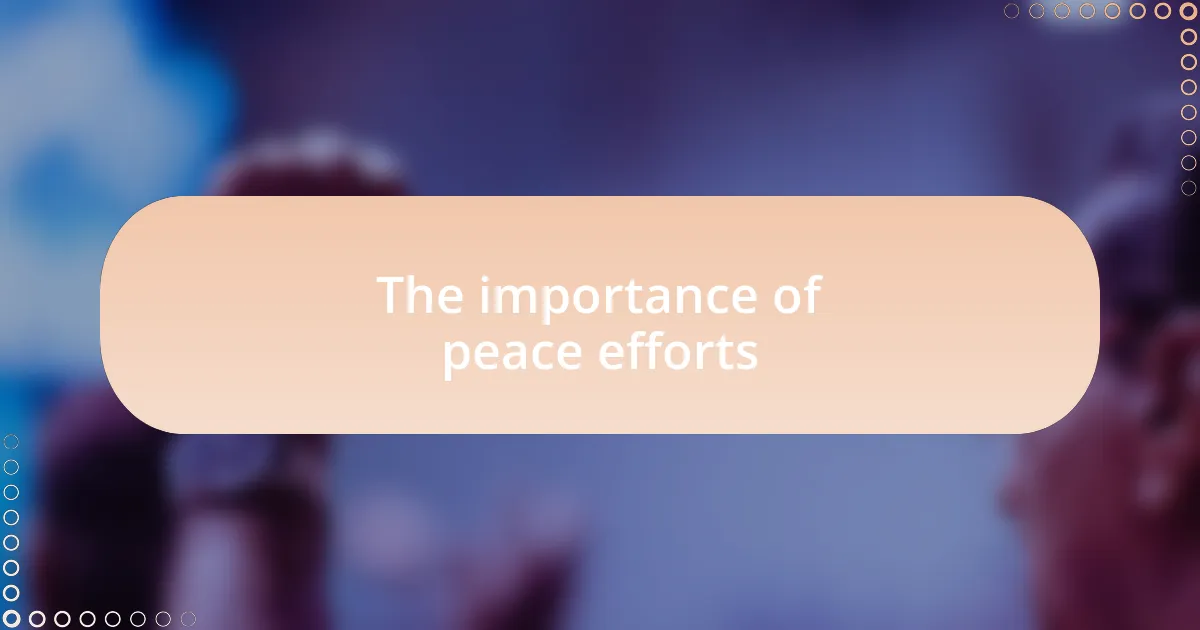
The importance of peace efforts
Peace efforts hold immense value as they act as the bridge between conflict and understanding. I recall a community meeting where local leaders came together, trying to foster dialogue among different groups. The atmosphere was charged with hope, illustrating that even in deeply divided environments, commitment to peace can spark transformative change.
When I think about peace efforts, I often reflect on a time when I volunteered at a conflict resolution workshop. The students had never interacted with each other before, yet by the end of the day, they were sharing laughs and stories. This experience underscored for me how powerful communication can be—it can dismantle preconceived notions and create connections that transcend historical grievances.
It raises an important question: What if we prioritized peace-building techniques as much as we do military strategies? In my view, emphasizing peace efforts is essential for holistic societal development. Every small initiative, whether it be community meetings or educational programs, plants the seeds for a more harmonious existence.
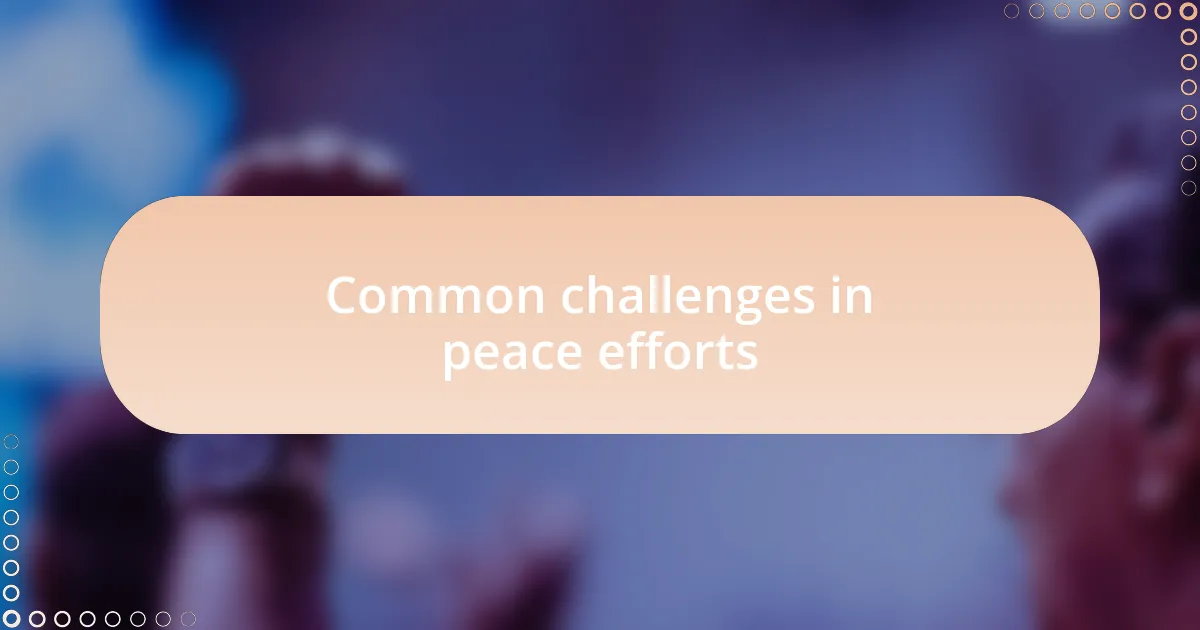
Common challenges in peace efforts
Navigating the landscape of peace efforts often reveals a myriad of challenges that can be disheartening. I remember attending a peace rally that turned chaotic due to miscommunication among the organizers. It struck me how easily intentions can get lost in translation, highlighting the crucial need for clear communication and a unified vision.
One of the most significant hurdles I’ve witnessed is the deep-seated mistrust that communities may harbor toward one another. During a workshop aimed at bridging divides, participants were initially hesitant to share their stories. This experience made me realize that building trust takes time and patience; without it, any peace initiative risks crumbling at the first sign of disagreement or tension.
Moreover, the influence of external actors often clouds these efforts, complicating the reality on the ground. I recall a discussion with activists who felt overshadowed by international organizations pushing their own agendas. It left me pondering: how can we ensure that local voices are prioritized in peace processes? Engaging local communities is vital; otherwise, peace efforts may become mere symbols rather than genuine movements for lasting change.
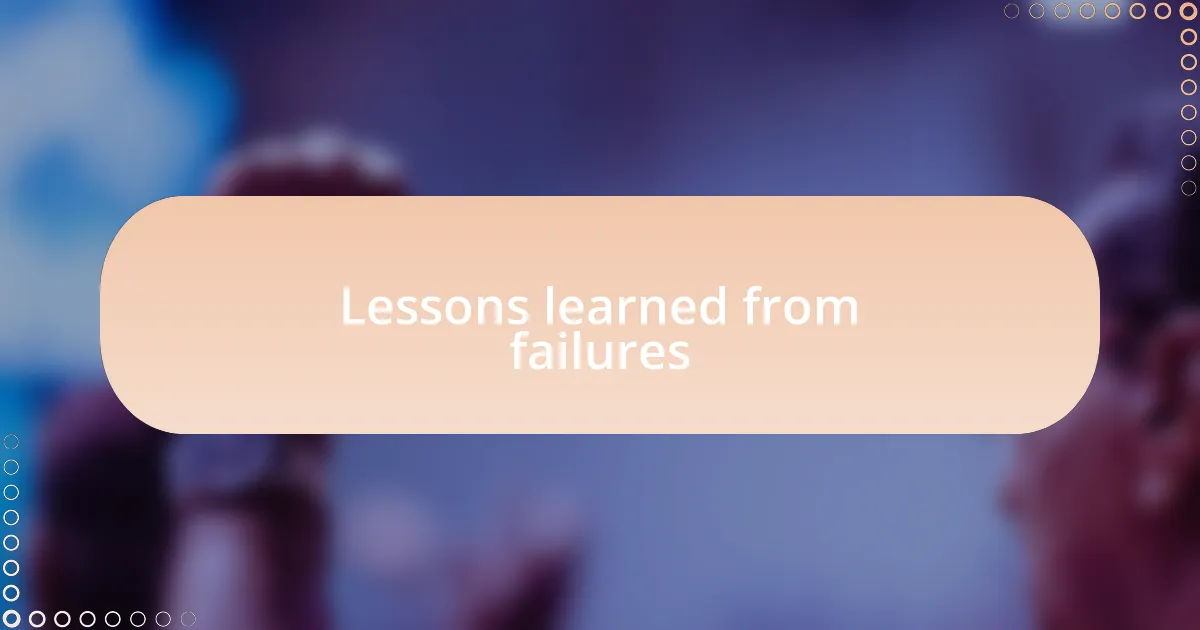
Lessons learned from failures
Reflecting on past failures in peace initiatives, I’ve come to understand that flexibility is key. I recall a community gathering where we had a solid plan in place, only to realize halfway through that it wasn’t resonating with the audience. This taught me that being adaptable and open to recalibrating strategies in response to feedback can make or break a peace effort. How often do we cling too tightly to our initial plans, not realizing they may not serve the community’s needs?
Another lesson I’ve learned is the importance of incorporating diverse voices from the start. I participated in a project where certain groups felt sidelined in discussions. Their eventual pushback illustrated how alienation can lead to failure. Have you ever felt excluded from a conversation? It reinforces the idea that inclusivity isn’t just a box to check; it’s essential in building true solidarity.
Lastly, I’ve often underestimated the emotional toll that sustained conflict takes on individuals. At a seminar on peacebuilding, I observed firsthand the weary faces of those who had been fighting for change for years. Their stories of loss were gut-wrenching, reminding me that understanding and addressing emotional wounds must be part of any peace initiative. Are we, as activists, doing enough to acknowledge and heal these deep-seated emotions in our efforts?
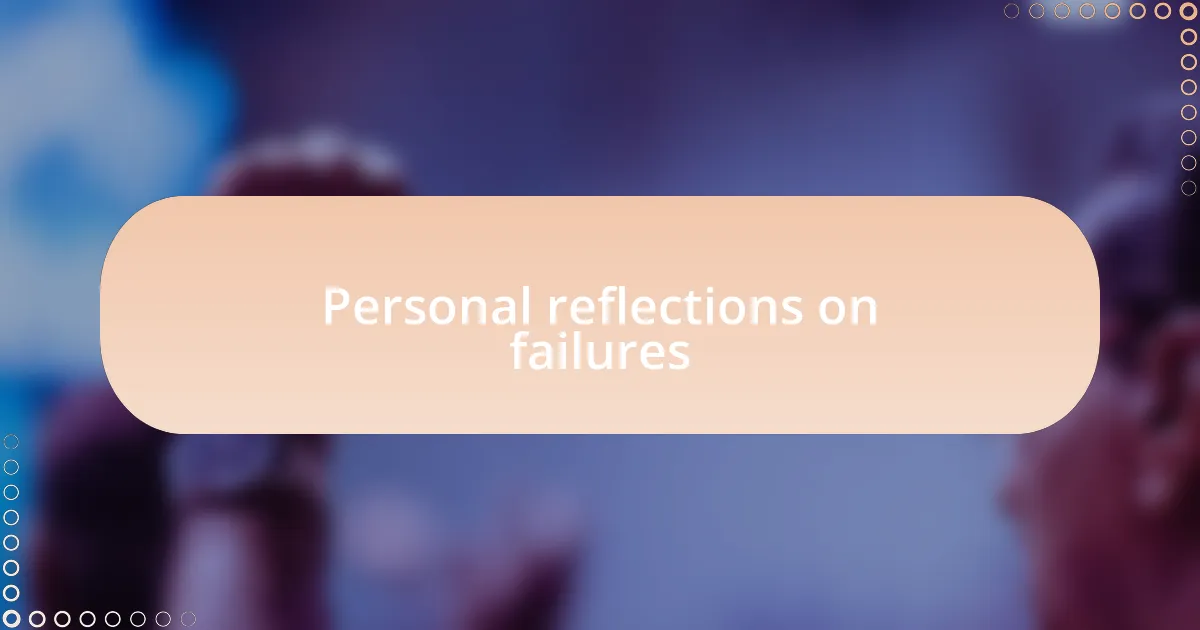
Personal reflections on failures
In reflecting on my personal failures in peace efforts, I’ve learned that sometimes the hardest lesson is recognizing my own limitations. There was a time when I spearheaded a campaign, passionately believing in my vision, only to encounter resistance I hadn’t anticipated. It made me realize that humility in leadership is crucial; acknowledging when I don’t have all the answers allows for collaboration and growth – isn’t it a bit humbling to consider that we often learn more from our missteps than our successes?
I’ve also come to appreciate the impact of timing in peace initiatives. I recall a moment when we organized a rally just as tensions escalated in the community. The turnout was disheartening; instead of fostering dialogue, it felt more like a futile gesture amidst chaos. This experience led me to ponder: how often do we rush into action without considering whether the moment is right for our message to be heard? It underscored that sometimes, stepping back and waiting for the right environment can be just as vital as taking action.
Emotional resilience can be a silent casualty in the pursuit of peace. I remember confiding in a fellow activist who had burned out after a series of failed initiatives. Her struggles made me reflect on my own experiences with disappointment and fatigue, highlighting that our well-being is directly tied to our effectiveness as advocates. Are we prioritizing self-care in this relentless journey for change? It’s a vital consideration, as our personal fortitude directly impacts our capacity to create lasting peace in our communities.
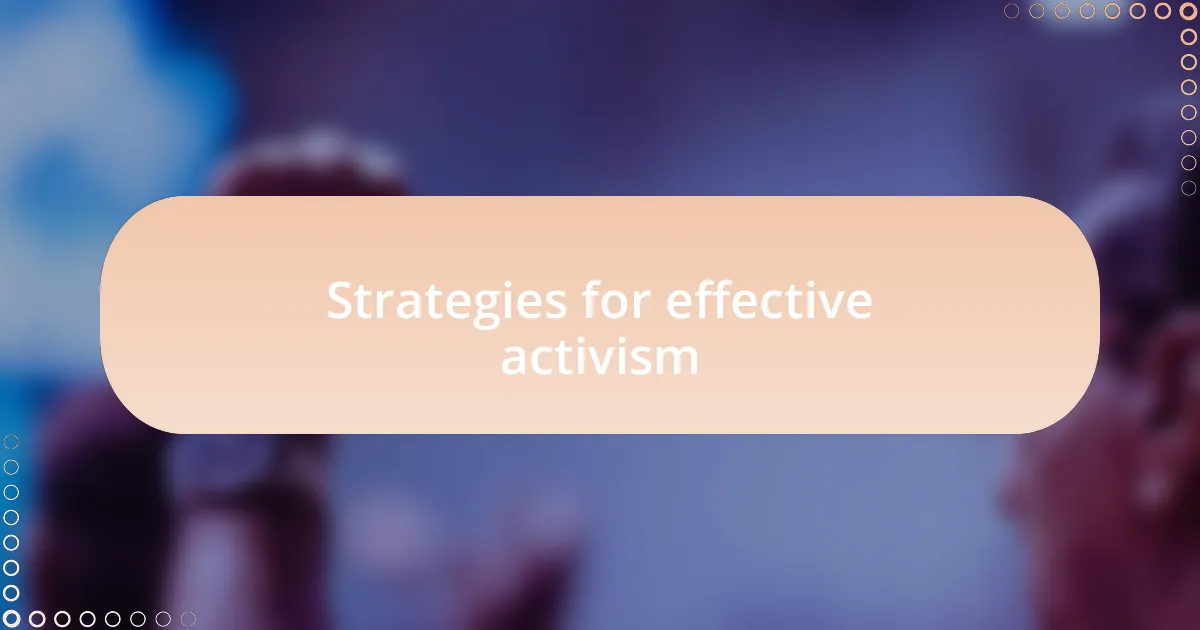
Strategies for effective activism
One effective strategy for activism that I’ve often found valuable is the power of storytelling. During a campaign aimed at nuclear disarmament, I invited survivors of atomic bombings to share their experiences. Their raw, emotional accounts cut through the noise and transformed abstract issues into relatable human stories. This led me to wonder: how can we leverage personal narratives to better connect with our audience? The answer lies in making our movements more relatable and accessible, reminding us all of the real-life stakes involved.
Another crucial approach is fostering inclusivity within our activist circles. I remember the initial resistance I faced when trying to create a more diverse coalition. It wasn’t until I reached out to marginalized communities that we truly began to understand the multifaceted nature of peace. Are we really listening to all voices in the conversation? Recognizing different perspectives enriches our strategies and ensures that our activism resonates with a broader audience.
Lastly, I’ve learned the importance of adaptability in our efforts. There was a time when our structured approach was met with apathy. Shifting toward more flexible methods, such as impromptu discussions in community spaces, made a significant difference. How flexible are we in our approaches? Embracing the unexpected not only keeps our activism fresh but also enables us to respond to the evolving dynamics of the peace landscape.
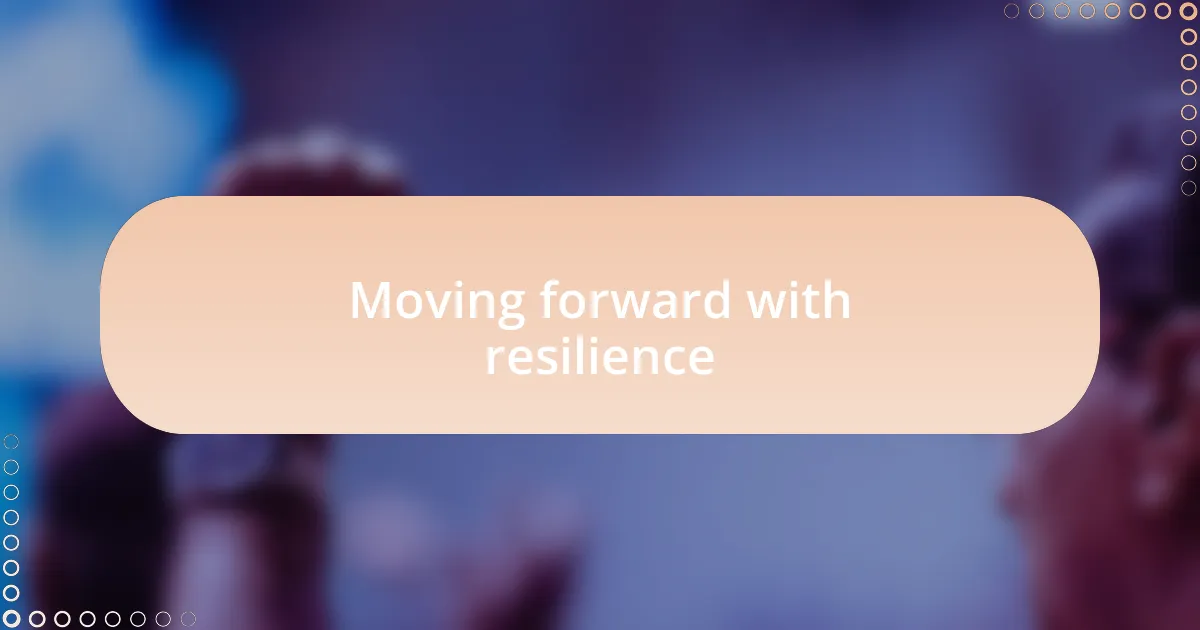
Moving forward with resilience
Resilience is like a muscle; it strengthens with use and can carry us through our toughest moments. I once attended a peace rally where everything went wrong—poor turnout, abrupt weather changes, and technical difficulties. Yet, in those challenging moments, I witnessed a group of determined activists band together, reminding me that our commitment to the cause can flourish even when things fall apart. How do we cultivate that spirit of resilience in ourselves and our communities?
Facing setbacks has taught me that it’s essential to analyze our failures without dwelling on them. After a campaign fell short of its goals, I gathered with my team to discuss what went wrong. This open dialogue turned shame into strength, sparking innovative ideas for future initiatives. It’s amazing what happens when we foster an environment where we can learn from our missteps. Are we allowing ourselves the space to reflect and grow from our experiences?
Pushing forward with resilience also means celebrating small victories along the way. I vividly remember organizing a small workshop that gained unexpected popularity, bringing together people from different backgrounds to discuss peace. This experience boosted our morale and reminded me of the importance of recognizing progress, however small. Are we taking the time to appreciate our wins? By acknowledging these moments, we not only fuel our passion but also inspire others to join us on this enduring journey toward peace.